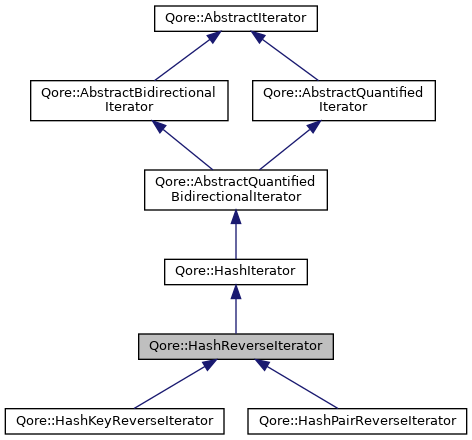 |
Qore Programming Language Reference Manual
1.9.1
|
 |
Qore Programming Language Reference Manual
1.9.1
|
This class an iterator class for hashes. More...

Public Member Methods | |
| constructor (hash< auto > h) | |
| Creates the hash iterator object. More... | |
| constructor () | |
| Creates an empty iterator object. More... | |
| copy () | |
| Creates a copy of the HashReverseIterator object, iterating the same object as the original and in the same position. More... | |
| bool | first () |
| returns True if on the last element of the hash More... | |
| bool | last () |
| returns True if on the first element of the hash More... | |
| bool | next () |
| Moves the current position to the previous element in the hash; returns False if there are no more elements; if the iterator is not pointing at a valid element before this call, the iterator will be positioned on the last element in the hash if the hash is not empty. More... | |
| bool | prev () |
| Moves the current position to the next element in the hash; returns False if there are no more elements; if the iterator is not pointing at a valid element before this call, the iterator will be positioned on the first element in the hash if the hash is not empty. More... | |
 Public Member Methods inherited from Qore::HashIterator Public Member Methods inherited from Qore::HashIterator | |
| constructor (hash< auto > h) | |
| Creates the hash iterator object. More... | |
| constructor () | |
| Creates an empty hash iterator object. More... | |
| copy () | |
| Creates a copy of the HashIterator object, iterating the same object as the original and in the same position. More... | |
| bool | empty () |
| returns True if the hash is empty; False if not More... | |
| string | getKey () |
returns the current key value or throws an INVALID-ITERATOR exception if the iterator is invalid More... | |
| auto | getKeyValue () |
returns the current value of the current hash key being iterated or throws an INVALID-ITERATOR exception if the iterator is invalid More... | |
| auto | getValue () |
returns the current key value or throws an INVALID-ITERATOR exception if the iterator is invalid More... | |
| hash< auto > | getValuePair () |
returns a hash with the current key and value (a hash with 2 keys: "key" and "value") or throws an INVALID-ITERATOR exception if the iterator is invalid More... | |
| reset () | |
| Reset the iterator instance to its initial state. More... | |
| bool | valid () |
| returns True if the iterator is currently pointing at a valid element, False if not More... | |
This class an iterator class for hashes.
Call HashReverseIterator::next() to iterate through the hash in reverse order; do not use the iterator if HashReverseIterator::next() returns False. A hash can be iterated in reverse order by calling HashReverseIterator::prev() instead of HashReverseIterator::next()
ITERATOR-THREAD-ERROR to be thrown.| Qore::HashReverseIterator::constructor | ( | ) |
Creates an empty iterator object.
| Qore::HashReverseIterator::constructor | ( | hash< auto > | h | ) |
Creates the hash iterator object.
| h | the hash to iterate |
| Qore::HashReverseIterator::copy | ( | ) |
Creates a copy of the HashReverseIterator object, iterating the same object as the original and in the same position.
|
virtual |
returns True if on the last element of the hash
Reimplemented from Qore::HashIterator.
|
virtual |
returns True if on the first element of the hash
Reimplemented from Qore::HashIterator.
|
virtual |
Moves the current position to the previous element in the hash; returns False if there are no more elements; if the iterator is not pointing at a valid element before this call, the iterator will be positioned on the last element in the hash if the hash is not empty.
This method will return True again after it returns False once if the hash is not empty, otherwise it will always return False. The iterator object should not be used after this method returns False
| ITERATOR-THREAD-ERROR | this exception is thrown if this method is called from any thread other than the thread that created the object |
Reimplemented from Qore::HashIterator.
|
virtual |
Moves the current position to the next element in the hash; returns False if there are no more elements; if the iterator is not pointing at a valid element before this call, the iterator will be positioned on the first element in the hash if the hash is not empty.
This method will return True again after it returns False once if hash is not empty, otherwise it will always return False. The iterator object should not be used after this method returns False
| ITERATOR-THREAD-ERROR | this exception is thrown if this method is called from any thread other than the thread that created the object |
Reimplemented from Qore::HashIterator.